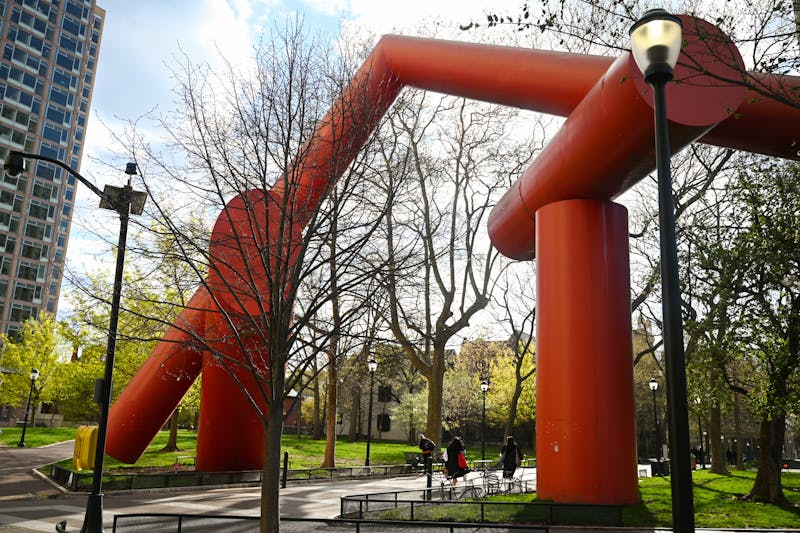
David Cohen (left) has been a long-time supporter of Rep. Chaka Fattah (not pictured), despite Fattah's potentially unethical actions. He has yet to donate since Fattah's indictment in July 2015. | DP File Photo
Under fire from federal prosecutors, embattled Rep. Chaka Fattah has long counted on one consistent source of support: David Cohen, the chairman of the Penn Board of Trustees.
Campaign filings show that Cohen, a 1981 Law School graduate and senior executive vice president of Comcast Corporation, was Fattah’s fifth-highest-paying individual donor in the 2014 election cycle. He gave $5,000 to Fattah’s campaign in 2014, $1,500 in 2012 and $1,000 in 2010 — along with an additional $1,000 in 2010 from Cohen’s wife, Rhonda, a 1980 Law School graduate.
During the time Cohen’s donations were made, federal law limited individual campaign contributions to $2,600 per election. That means a single individual can contribute twice: once in the primary election and again in the general election.
His relationship with the congressman extends back decades and may even continue this spring when Fattah faces a tough primary against three Democratic contenders.
According to Federal Election Commission filings, Cohen has individually contributed to Fattah’s campaign since at least 2000. Suspicion surrounding financial impropriety has hovered over the congressman since a failed 2007 mayoral bid, when he was found to have brokered an off-the-books $1 million loan.
A January 2014 Justice Department audit found evidence of Fattah earmarking nearly half of a $771,000 federal grant for a nonprofit whose only staff member was previously a Fattah aide.
Despite the overtures of federal investigators in January 2014, Cohen gave his largest single-year contribution to Fattah, $5,000, months later.
“I’ve been a longtime political supporter of his,” Cohen said in an interview. “He’s been a very effective and an important federal legislator for issues that matter to me personally.”
One of these issues, Cohen pointed out, is access to higher education. Fattah, a 1986 Fels Institute of Government graduate, authored the 1998 GEARUP bill, which provided federal grants to students applying for college.
As an 11-term congressman from West Philadelphia — whose area of representation includes Penn — Fattah has had a long record of supporting schools and lower-income families in the city. He’s also had a trail of federal prosecutors on his back for years, culminating in a July 2015 indictment on nearly 30 charges including bribery, money laundering and bank fraud. Fattah’s press office deferred comment to his campaign press team, which was not immediately available.
On Feb. 2, Fattah’s son, Chaka Fattah, Jr., was sentenced to five years in prison on unrelated charges concerning nearly $1 million in loans he misspent as a school management subcontractor.
Cohen’s company, Comcast Corporation, the largest broadcasting and cable company in the world, also has a long history of donating to Fattah. The company contributed $10,000 to Fattah in 2013, with a grand total of nearly $50,000 in donations between between 1998 and 2013, campaign filings show.
For high-rollers like Cohen and major corporations like Comcast, donating to congressmen from both parties is not unusual — it’s standard operating procedure, said Randall Miller, history professor at Saint Joseph’s University. The only reason to raise an eyebrow is if they continue to donate money after a potential scandal has come to light, he added.
“Fattah’s actions are probably unethical and perhaps illegal,” Miller said. “The extent to which Cohen knew that and did anything in terms of support of Fattah might raise a question.”
Though Cohen has yet to donate since Fattah’s indictment, their political relationship may continue. Cohen has not given money to Fattah’s reelection campaign yet, but did not rule out doing so in the future. Pennsylvania’s primary election is on April 26.
“The indictment is troubling, and I’m not sure yet what I’m going to do,” he said. “It’s an unfortunate situation for him and his family, and for Philadelphia.”
Penn Vice President for University Communications Steve MacCarthy said Penn does not typically comment on private donations. “Board members are no different from any other private citizen; they are free to support whomever they choose,” he wrote in an emailed statement.
Cohen, who formerly served as chief of staff to former Philadelphia mayor and 1965 College graduate Ed Rendell, regularly gives money in local and national political elections. This cycle, he’s contributed to Rep. Bob Brady — also the chairman of the City Democratic Committee — and Sen. Pat Toomey (R-Pa.), among others.
Of Fattah’s two opponents in the spring primary, Cohen has only given to one — state Rep. Dwight Evans — according to campaign donation data from the last five election cycles. Cohen contributed $500 in 2006 and $1,000 in 2008 to Evans. Both of Fattah’s opponents have more money on hand than him.
“What that says is Cohen and Comcast, they see a dead man walking,” Miller said.
The Daily Pennsylvanian is an independent, student-run newspaper. Please consider making a donation to support the coverage that shapes the University. Your generosity ensures a future of strong journalism at Penn.
DonatePlease note All comments are eligible for publication in The Daily Pennsylvanian.








